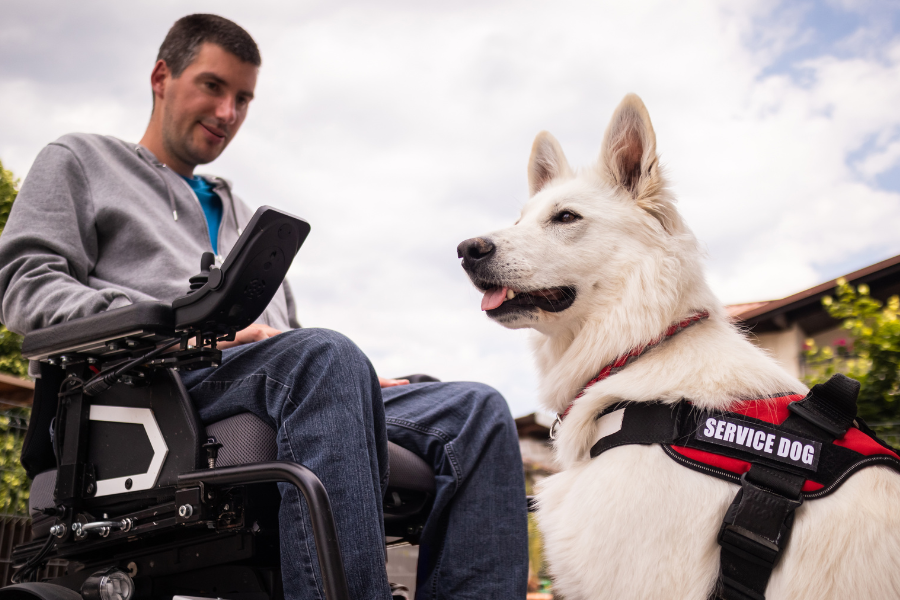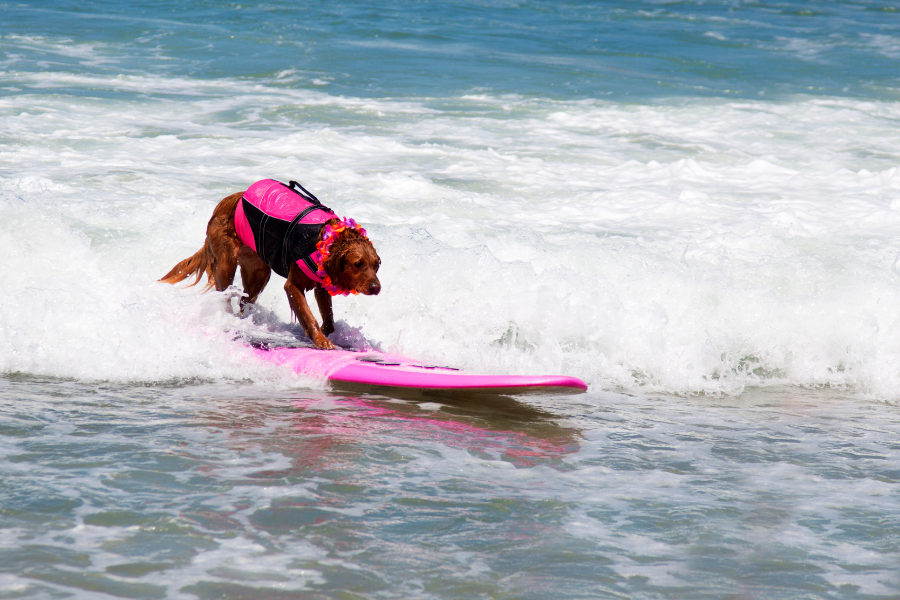
Best Breeds for Service Dogs: Choosing the Right Partner for Your Needs
- Published on:
- By: ASP Team
Not every breed—or even every individual dog—is equipped to handle the unique challenges of service work. Good service dogs must be meticulously task-trained, remain calm under pressure, and respond instinctively to their handler’s needs.
In this guide, we’ll explore the top dog breeds ideal for service work, the traits that make them exceptional, and how to begin the training process.
Whether you prefer hands-on methods or a structured online program like iTrain Academy by American Service Pets, we’ll help you take the first steps toward building an effective and rewarding partnership.
What Makes a Dog Breed Good for Service Work?
Successful service dogs often possess specific traits that make them well-suited for the job.
High intelligence and the ability to learn quickly are essential, allowing them to master complex tasks. A stable temperament is equally important, ensuring they remain calm and focused even in high-stimulus environments.
Additionally, these good service dogs demonstrate a strong work ethic and a natural willingness to please, which are crucial for consistent performance. Non-aggressive and non-reactive behavior further enhances their suitability for service roles.
Physical health and appropriate energy levels are also key factors, as service work can be both mentally and physically demanding. Certain breeds, bred for these qualities, tend to be more reliable candidates for service-related tasks.
Good Service Dogs: Top Breeds for Service Work
1. Labrador Retriever
Why They Excel:
Labradors are one of the most popular choices for service dog roles such as guide work, mobility assistance, and psychiatric service tasks. Their friendly and gentle nature, combined with their even temperament and eagerness to please, makes them a dream to train.
Labradors are highly adaptable and thrive in various environments, from busy cities to quiet homes. Their intelligence allows them to learn complex tasks, and their social nature ensures they bond deeply with their handlers.
Best For:
- Mobility and physical support
- PTSD and anxiety disorders
- Guide and hearing tasks
Get Your ESA Today
2. Golden Retriever
Why They Excel:
Closely related to Labradors in temperament and trainability, Golden Retrievers are renowned for their gentle, intuitive, and social nature. They excel at creating deep emotional connections with their handlers, making them ideal for tasks that require empathy and attentiveness.
Golden Retrievers are particularly good with children and families, making them a versatile choice for service work in homes with younger members. Their patience and adaptability also allow them to perform well in public settings.
Best For:
- Emotional support and psychiatric service
- Medical alert tasks (e.g., detecting blood sugar changes)
- Seizure response
3. Standard Poodle
Why They Excel:
Poodles are among the most intelligent dog breeds, often surprising those unfamiliar with their potential. In addition to their remarkable trainability, they are hypoallergenic, making them an excellent choice for handlers with allergies.
Poodles are highly focused and have exceptional problem-solving skills, which allows them to excel in complex service tasks. Their elegant appearance is paired with a sharp mind, and they thrive in environments where attention to detail is necessary.
Best For:
- Psychiatric service and emotional support
- Guide work for allergy-sensitive environments
- Diabetic and seizure alert
4. German Shepherd
Why They Excel:
German Shepherds are powerful and naturally protective, making them an excellent choice for roles requiring physical support or security.
They are highly intelligent and loyal, with a strong work ethic that allows them to learn and perform complex tasks efficiently. While they may require consistent socialization due to their protective instincts, their adaptability and focus make them one of the most reliable service dog breeds.
They are particularly well-suited to handlers with PTSD, as they can provide both emotional support and physical security.
Best For:
- Mobility and brace support
- PTSD, anxiety, and panic disorders
- Hearing alert tasks
5. Border Collie
Why They Excel:
Border Collies are known for their intense focus and exceptional learning ability. As one of the most intelligent dog breeds, they are capable of mastering advanced task work and medical alerts. However, due to their high energy levels and need for stimulation, they may not be the best fit for first-time handlers.
When placed in the right environment, Border Collies thrive and excel in performing detailed and complex tasks. Their alertness and rapid response times make them especially effective for medical emergencies.
Best For:
- Seizure alert and interruption
- Psychiatric task performance
- Diabetic alert
6. Bernese Mountain Dog
Why They Excel:
Bernese Mountain Dogs are known for their calm demeanor, strength, and affectionate nature. These gentle giants are particularly well-suited to tasks that require mobility and balance support due to their size and sturdy build.
Their calmness makes them a comforting presence for handlers with psychiatric service needs, offering both emotional stability and physical assistance. They are also incredibly loyal and intuitive, forming deep bonds with their handlers.
Best For:
- Brace and mobility support
- PTSD and anxiety disorders
- Stability tasks for physical disabilities
7. Boxer
Why They Excel:
Boxers are strong, affectionate, and highly attuned to their handlers’ emotional needs. Their energetic yet loving personalities make them well-suited for psychiatric support roles, where they can provide comfort and companionship.
Boxers excel at recognizing emotional distress and are particularly effective in providing deep pressure therapy to calm anxiety or panic attacks. Their playful nature also adds a sense of joy to their handler’s daily life.
Best For:
- PTSD and anxiety
- Psychiatric support
- Deep pressure therapy
8. Great Dane
Why They Excel:
Despite their massive size, Great Danes are known for their gentle and calm temperament, earning them the nickname “gentle giants.”
Their size and strength make them ideal for handlers needing balance or stability assistance, while their affectionate and intuitive nature makes them excellent emotional support companions.
Great Danes are particularly effective for handlers with chronic fatigue or neurological conditions, as they can provide both physical and emotional stability. Their presence alone offers a sense of security and comfort.
Best For:
- Mobility and balance support
- Chronic fatigue and neurological conditions
- Anxiety and emotional regulation regulation
Key Factors in Choosing a Service Dog Breed
When choosing a service dog, temperament should always outweigh breed. While certain breeds are naturally inclined toward specific tasks, a dog’s individual personality is what truly matters.
For example, not every Labrador is naturally calm, and not all German Shepherds are easy to train. Assessing a dog’s temperament—such as their social tolerance, focus, and adaptability—is essential to ensure they are well-suited for the demands of service work.
Other crucial factors include size and compatibility with your lifestyle. Small to medium breeds, like Poodles, excel at tasks such as alerting or providing psychiatric support.
On the other hand, larger breeds, like Labradors or Great Danes, are better equipped for mobility assistance. It’s also important to match the dog’s energy level to your living environment and daily routine for a seamless partnership.
By prioritizing these considerations, you’ll set the foundation for a successful and harmonious relationship with your service dog.
Can You Train a Service Dog Yourself?
Yes. According to the ADA, you are legally allowed to train your own service dog. No certification or formal registration is required. However, the dog must be:
- Task-trained for your specific disability
- Well-behaved and under control in public
- Reliable in performing service-related tasks
For those without access to in-person trainers, online programs like iTrain Academy offer an accessible, affordable, and effective way to train your dog properly.
How iTrain Academy Helps You Train Good Service Dogs
American Service Pets developed iTrain Academy to empower dog owners to prepare their animals for public access and service roles—from the comfort of home.
Program Features:
- Daily obedience and public behavior modules
- Task-specific training for psychiatric and mobility support
- Flexible video lessons (just 15 minutes a day)
- Easy to follow for first-time dog handlers
Do You Need a Doctor's Letter?
While a letter is not legally required, having a Psychiatric Service Animal (PSA) letter or medical recommendation can simplify interactions with landlords, employers, and travel providers.
Through American Service Pets, you can:
- Complete a brief online intake
- Be evaluated by a licensed clinician in your state
- Receive your letter digitally if you qualify
This ensures your disability is recognized and your rights are protected—especially during housing or travel.
FAQs
Can any dog become a service dog, or does breed matter?
While any breed can potentially become a service dog, some breeds are naturally more suited due to traits like intelligence, calm temperament, and responsiveness. Breeds like Labradors, Golden Retrievers, and Standard Poodles consistently perform well across service categories—but what matters most is the individual dog’s behavior and ability to learn task-specific skills.
What if I already have a dog—can they be trained for service?
Yes, as long as your current dog meets the core requirements: calm under pressure, trainable, and responsive. With consistent training and proper evaluation, many dogs can transition into service roles. Platforms like iTrain Academy provide accessible at-home training for both new and existing pets.
How do I choose the right breed for my specific disability?
Start by identifying your support needs—such as mobility assistance, psychiatric help, or medical alert. Then match those needs to breeds known for excelling in those roles. For example, large breeds like Bernese Mountain Dogs are great for balance support, while Poodles and Boxers work well for emotional and psychiatric tasks.
Conclusion
The ideal service dog breed is the one that aligns perfectly with your unique needs, personality, and lifestyle. While Labrador Retrievers and Golden Retrievers are popular choices for good reason, other breeds such as Poodles, German Shepherds, or even Bernese Mountain Dogs can also be good dogs for service dogs and might just be the perfect match for your circumstances.
Here’s how to get started:
- Explore the characteristics of different breeds
- Assess your specific service needs
- Begin obedience and task training as early as possible
- Leverage expert support like iTrain Academy
At American Service Pets, we’re committed to supporting your service animal journey. From training tools and qualified provider letters to educational resources on service animal rights, we’re here to help you every step of the way.

The benefits of an Emotional Support Animal certification and a Psychiatric Service Dog certification are drastically different. Fortunately for you, American Service Pets’ network of active board certified doctor or other licensed mental health providers can help you find the right path to certification. To find out whether you need an ESA or PSD letter, take our easy, three-step Pet Owner Survey!
More Great Resources





